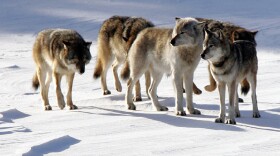Update: Friday, February 7, 2014
The ice bridge to Isle Royale has formed. See our post here.
Original post: January 9, 2014
Wolves first came to Isle Royale in Lake Superior by crossing an ice bridge in the late 1940s, but these ice bridges have not been forming as often in recent years and the wolf population on Isle Royale has been suffering as a result.
Wolf researchers on Isle Royale National Park are watching to see whether the recent blast of arctic air and sub-zero temperatures builds an ice bridge this year. The last time one formed was in 2008.
(Scroll through the photos above to see how the ice has been forming since Jan. 1. The images are from NASA imaging satellites that make daily passes over the U.S.)
Such an ice bridge could mean new genes for a struggling wolf population. Inlast year's survey, researchers found just eight wolves left on the island.
The wolf population on Isle Royale declined 66% in four years – going from 24 in 2009 to eight in 2013. Researchers heard pups call this past July, but have yet to confirm whether these pups have survived.
Study hangs in the balance
Researchers on Isle Royale have been studying how wolves interact with their prey (moose) for more than 50 years. It's the longest continuous study of any predator-prey system in the world, and there's a lot of interest in keeping the project alive.
The last year researchers documented a new wolf crossing to the island was in 1997.
Ice bridge decline
In the 1960s, these ice bridges formed an average of two out of three winters. Today, with a warmer climate, they form about one in 10 years. Here's a graph showing the decline in ice bridge formation:

Rolf Peterson of Michigan Technological University has been studying the predator-prey ecosystem on Isle Royale since the 1970s. He says it's possible that an ice bridge will fully form this year.
"The probability of an ice bridge this winter is probably more than the average of less than 10% because of the pattern so far of below average temperatures. But that can also change abruptly," said Peterson.
Temperatures are expected to get much warmer in the coming days, but they'll remain below freezing around Isle Royale.
But Peterson points out that more than sub-zero temperatures are needed. He says the winds also have to be relatively calm as well. You can see how the ice was swept away by January 5 in the photos above.
As for the probability that new wolves would come to the island, Peterson says, "It's not possible to say, but it may be more likely that wolves would leave the island."
Next Monday, if the weather permits, researchers will begin their annual winter study on Isle Royale.
This is their best chance to get a count of how many wolves are left by making flights over the island.
In the meantime, the National Park Service is collecting public input on what should be done about the wolf decline on Isle Royale. Isle Royale National Park is a designated wilderness, which means they normally take a hands-off approach. It will be up to the park's superintendent to decide the next steps. Peterson has said he favors bringing new wolves in before the current population dies out.











